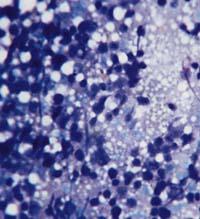Double effect of vitamin D
2006/05/01 Elhuyar Zientzia Iturria: Elhuyar aldizkaria

Despite the benefits of vitamin D to combat the loss of bone pulp, a Japanese researcher, during his research for a pharmacy office, has found that this same vitamin can produce an opposite effect.
Although the situation seems paradoxical, the physiologist Ikeda finds an explanation. To do this, he has studied a signal called RANK. This signal forces the cells to become osteoclasts, that is, a type of cells that destroy the bone. Vitamin D is good for the bones because it cuts the RANK signal, that is, it prevents pre-osteoclast cells from becoming osteoclast.
But it is not the only thing that vitamin D does, and that is why the paradox arises. In fact, the second thing that vitamin D does is to increase the RANK signal in bone building cells and convert them into osteoclasts.
According to this, vitamin D benefits people who suffer a great bone loss. In the rest the balance is balanced.



